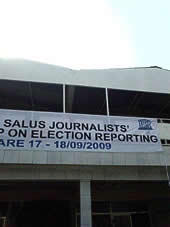Radio journalists trained on election reporting in Rwanda
05-10-2009 (Paris)

The UNESCO initiated Radio Salus project continues to strengthen professional journalism in Rwanda: around thirty journalists from the radio were given a two-day training on election reporting ahead of the August 9, 2010 Rwanda’s presidential elections.
The panelists, many of whom with fragile journalism experience, will be covering the event for their very first time ever since post-Genocide Rwanda got more than one radio station.
Radio Salus was established in 2005 at the National University of Rwanda (NUR) in Butare, as a result of a project implemented by UNESCO and funded by the European Commission and the Japanese government to create a new, independent media outlet. It now broadcasts 24 hours a day, seven days a week and its programmes reach the entire Rwandan public and neighboring communities in DRC and Burundi.
The team, at the radio, which includes journalism students, produces a variety of news, educational and entertainment programming each day. By November 2008, more than 100 young journalists had received training through Radio Salus; many students continue to work there as trainee journalists.
“When you are not informed, you can’t inform the audience”, said Aldo Havugimana, Radio Salus’ Director when he opened the recent election's reporting training.
This workshop provided the journalists working for Radio Salus, solid knowledge on election laws and rules, understanding of the Rwandan journalists’ code of conduct during elections and professional standards of free and fair elections, and the ability to cover elections independently and professionally.
One of the participants, Berthine Gikundiro, who will be covering elections for the first time, said that the workshop had been of great importance to know “How often have I reported on elections? Not even a single time. Now I know much better how to do this." she said.
According to Protais Rumanzi, Director of the electoral operations unit in Rwanda’s National Electoral Commission (NEC), journalists indeed need training prior to the upcoming presidential elections. “Democracy is expensive, yet we have no much time left. We have less than one year”, he said.
Radio Salus was established in 2005 at the National University of Rwanda (NUR) in Butare, as a result of a project implemented by UNESCO and funded by the European Commission and the Japanese government to create a new, independent media outlet. It now broadcasts 24 hours a day, seven days a week and its programmes reach the entire Rwandan public and neighboring communities in DRC and Burundi.
The team, at the radio, which includes journalism students, produces a variety of news, educational and entertainment programming each day. By November 2008, more than 100 young journalists had received training through Radio Salus; many students continue to work there as trainee journalists.
“When you are not informed, you can’t inform the audience”, said Aldo Havugimana, Radio Salus’ Director when he opened the recent election's reporting training.
This workshop provided the journalists working for Radio Salus, solid knowledge on election laws and rules, understanding of the Rwandan journalists’ code of conduct during elections and professional standards of free and fair elections, and the ability to cover elections independently and professionally.
One of the participants, Berthine Gikundiro, who will be covering elections for the first time, said that the workshop had been of great importance to know “How often have I reported on elections? Not even a single time. Now I know much better how to do this." she said.
According to Protais Rumanzi, Director of the electoral operations unit in Rwanda’s National Electoral Commission (NEC), journalists indeed need training prior to the upcoming presidential elections. “Democracy is expensive, yet we have no much time left. We have less than one year”, he said.
Related themes/countries
· Rwanda
· Training of Media Professionals
· Weekly newsletter
Share this story:
Contact information
- UNESCO
Source















